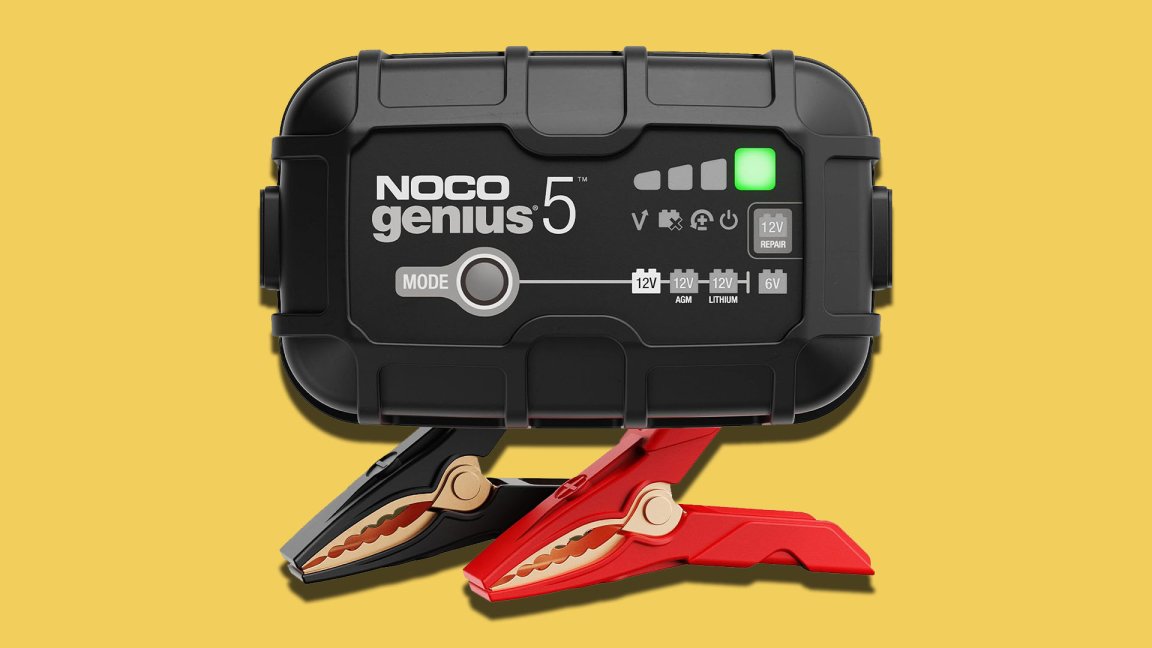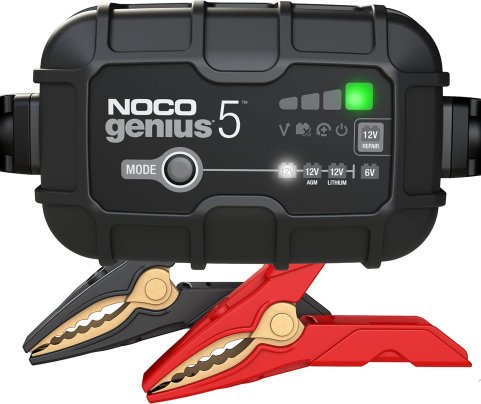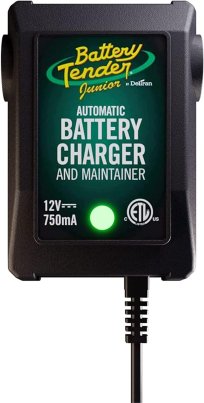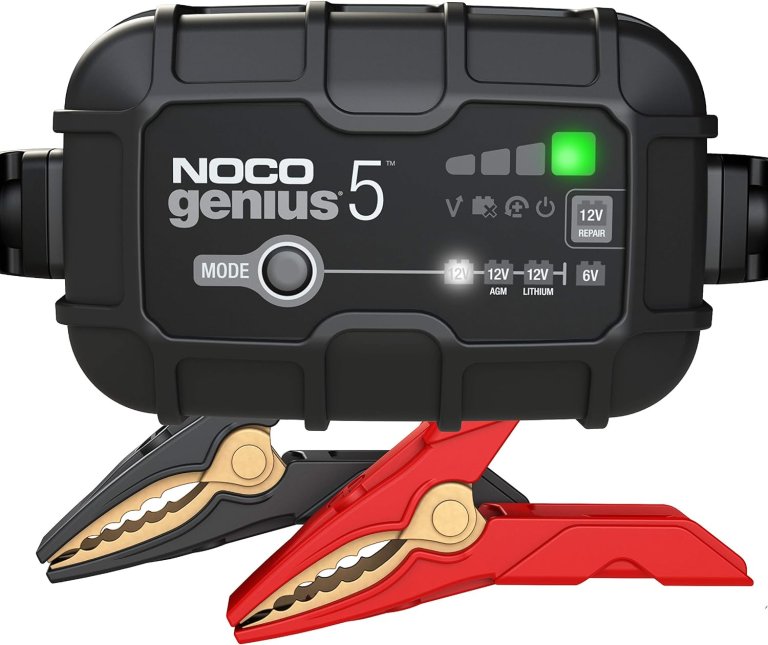We may earn revenue from the products available on this page and participate in affiliate programs. Learn more ›

Why does it always seem like your car battery chooses the day you’re running late to get to work in the cold, dark, snow, or rain to give up the ghost and stop working? You jump in the car, turn the ignition, and…nothing. Whether it’s because your car battery is past its prime, has been sitting unused for too long, or you’ve accidentally left an overhead light on all night, having a dead car battery is never a happy surprise.
You can easily avoid all these headaches and irritation by using a low-cost, efficient car battery charger, also known as a trickle charger. While these compact and affordable devices don’t mean you’ll never have to replace your car battery again, they can help extend the life of your car battery or even help bring it back from the dead, thus saving you valuable time and money. To help you figure out which of the plentiful choices on the market is worth your investment, I’ve come up with a list of my top favorites, along with what to look for to ensure you’re getting a durable and dependable choice that will keep your car ready to roll for years to come.
Summary List
- Best Overall: NOCO Genius5 Fully-Automatic Smart Charger
- Best Value: Battery Tender Junior 12V Charger and Maintainer
- Honorable Mention: Schumacher SC1667/SC1666 Manual Battery Charger and Jump Starter
- Best Heavy-Duty: Schumacher Electric Charger/Starter/Maintainer and Auto Desulfator
- Best Kit: CTek MXS 5.0-12 Volt Battery Charger and Maintainer Garage Kit
Our Methodology
When it comes to choosing the best car battery chargers, I wanted to provide you with a well-rounded list that features a good variety of reputable manufacturers with solid track records of providing high-quality, reliable products. I included a wide range of price points to suit any budget. I focused on battery chargers that use the latest technology and that feature innovative, high-tech designs suitable for a wide variety of vehicles. Also, I narrowed the list by leaving off anything that’s more suited for professional commercial use. This list focuses more on everyday personal-use chargers that are great for keeping in your home garage. For more information on the selection criteria, click this link to The Drive’s Gear About page, which explains our methodology further.
Best Car Battery Chargers Reviews & Recommendations
Best Overall: NOCO Genius5 Fully-Automatic Smart Charger
Pros
- Backed by a three-year warranty
- Versatile, multifunctional use
- Can recharge dead batteries as low as zero volts
Cons
- Instruction manual is somewhat vague
- May automatically fall out of Force Mode when unattended
The NOCO Genius5 Fully-Automatic Smart Charger combines power, reliability, longevity, cutting-edge technology, and price point to outshine most other battery chargers on the market. Time and again, the NOCO line makes it into one of the top positions on my list of best products. The NOCO Genius5 Fully-Automatic Smart Charger is the ideal item to make my top overall pick. Not to mention, the company is continually improving and updating its designs in order to deliver the best results consistently. For example, the Genius5 is 34 percent smaller and delivers 65 percent more power than its predecessor, the G3500.
This model is designed for use with 6- or 12-volt batteries. It can be safely used on marine, powersport, RV, and deep-cycle batteries, making it a versatile choice. Use it on gel, flooded, AGM, lithium-ion batteries, and more, safely and effectively. It can charge batteries as low as one volt. There’s also a handy “Force mode” that lets you manually begin charging a dead battery down to zero volts. An advanced battery repair mode can also help you recondition your battery to extend its life.
This charger does lose some love for not having the clearest and most concise instruction manual. Force mode can occasionally kick off when unattended, so be sure to check your charger regularly during the first few hours of use.
Best Value: Battery Tender Junior 12V Charger and Maintainer
Best Value
Battery Tender Junior 12V Charger and Maintainer
See ItPros
- Affordable
- Easy to use
- Backed by a five-year warranty
Cons
- Not as versatile as other options
- Can only maintain the charge on a car battery, not charge it from dead
The Battery Tender Junior 12V Charger and Maintainer is an excellent choice if you want a super budget-friendly and reliable charger for your favorite toys. It comes backed by an impressive five-year warranty and is super straightforward and simple to use. While the beauty of this unit lies in its simplicity, it does offer a complete four-step charging program that optimizes battery power without damaging it. Initialization stage checks the battery connection and charge level. Bulk charge, absorption mode, and float mode ensure that the battery reaches a full charger without damage.
This compact and affordable model does have some limitations. For starters, it only offers 750 mA of charging capacity, making it capable of charging and maintaining dirt bikes, lawnmowers, ATVs, jetskis, and the like. It can maintain a charge on a car battery, but it isn’t strong enough to charge it from dead. It’s also not suitable for boats. It can be hooked up wrong, but does offer reverse polarity protection for added safety.
Honorable Mention: Schumacher SC1667/SC1666 Manual Battery Charger and Jump Starter
Pros
- High reliability
- Excellent performance
- Quality construction
- Doubles as a jump-starter
Cons
- Requires more user input than most
- Takes up a lot of space
Schumacher’s line of battery chargers is always worth putting on your radar. The sheer reliability is second to none. Many would argue it’s the absolute best in the segment. After testing and reviewing the SC1666/SC1667 manual charger, I can see why.
This is a manual charger, but it’s incredibly easy to use once you familiarize yourself with the formulas. It was able to charge multiple batteries in my shop. That includes one that was dead flat. The quality throughout is top-tier, despite being marketed toward DIYers. That, plus the inclusion of a jump starting function helps separate this from most offerings.
The fact that it is a manual charger is a real drawback for some. Even if it’s pretty easy to use, it’s not as easy as hooking up a couple of leads and walking away. Also, it is much larger than most options, and you will need to dedicate a considerable amount of space to it.
Best Heavy-Duty: Schumacher Electric Charger/Starter/Maintainer and Auto Desulfator
Pros
- Heavy-duty clamps and cables
- Can also act as a jump starter and desulfator
- Helps diagnose battery issues
Cons
- Heavier and bulkier than some others
- Frequent quality control concerns
The Schumacher Electric Charger easily earns the right to be in any car owner’s garage. Not only is it a powerful battery charger and maintainer, but it can also jump start a dead battery and perform diagnostic tests to help you figure out why your battery died in the first place. With 100-amp jump start and 30-amp boost mode, this charger gets the job done quickly and efficiently. It can even start SUVs and trucks, which a lot of the smaller chargers cannot do. This unit works on all 12-volt AGM, STD, deep-cycle, and gel batteries, as well as 6-volt batteries. Another great feature of this rugged charger is the long leads that give you plenty of room. The alligator clamps are also strong and will hold onto battery terminals with confidence.
The drawback to this rugged charger is that it’s less compact and lightweight than many others. There are also several quality control concerns from various sources.
Best Kit: CTek MXS 5.0-12 Volt Battery Charger and Maintainer Garage Kit
Pros
- Complete kit ideal for most garages
- Backed by a five-year warranty
- Some of the most advanced technology on the market
Cons
- Expensive
- Not suitable for lithium-ion or 6-volt applications
The CTek MXS 5.0 Kit gives you everything you need, including a precision-engineered 12-volt battery charger, extension cable accessory, wall mount for out-of-the-way storage, cigarette plug accessory, and an indicator eyelet accessory. CTek produces top-quality battery chargers and the company is well-known for its commitment to quality. The MXS 5.0 is the latest in advanced technology. The charger uses an advanced microprocessor to not only automatically control charging, but to also automatically compensate for temperature differences. This ensures that your battery charges at an optimal level, regardless of the surrounding ambient temperature. It’s capable of charging batteries up to 110Ah and maintaining batteries up to 160Ah, making it a powerful choice. This unit also offers a reconditioning mode to help improve and extend the life of your battery.
The drawback is that this is a somewhat pricey unit in comparison to many others, although it does come backed by an impressive five-year warranty. It’s also not suited for lithium-ion or 6-volt batteries.
Our Verdict on Car Battery Chargers
If you want the best overall car battery charger in terms of power, dependability, ease of use, versatility, and price point, my top pick is the NOCO Genius5 Fully-Automatic Smart Charger. This model is designed for use with 6- or 12-volt batteries and can be safely used on marine, powersport, RV, and deep-cycle batteries, making it a versatile choice. For a high-quality, budget-conscious choice, consider the Battery Tender Junior 12V Charger and Maintainer. It’s an excellent choice if you want a super budget-friendly and reliable charger for your favorite toys.
What to Consider When Buying a Car Battery Charger
While there are many similarities between most of the best car battery chargers on the market, it’s not a one-size-fits-all consideration. There are several important key factors to familiarize yourself with to ensure you’re getting the best choice to suit your needs and that will hold up to the serious wear and tear over time and continue to deliver reliable power when you need it most.
Car Battery Charger Key Features
Voltage
A battery charger’s rated voltage is the measure of its strength, essentially. The voltage determines if a particular charger is strong enough to fully recharge your particular vehicle’s battery. Since most cars run on a 12-volt system, this is pretty straightforward. However, if you’re looking for a charger that will do double-duty and charge your powersports, golf carts, etc., consider getting a charger that offers 6- or 24-volt options as well.
Amperage
Amperage is the measure of current the charger will put through it while it’s working. Generally, a higher amperage equals faster charging times. Most car battery chargers fall in the range of 5-8 amps. If you want super fast charging times, consider going for 10-30 amps. If you’re looking to leave something plugged in all winter or during an off-season, lower amperage is likely fine.
Automatic Function
In today’s busy and fast-paced society, you probably don’t have a ton of extra time to sit around checking and rechecking your battery charger. Look for a charger that offers automatic sensors and functionality that will monitor all stages of charging and switch into float mode once your battery is sufficiently charged to prevent overcharging and damage to your battery.
Safety Features
A high-quality car battery charger will have a bunch of extra safety features built-in to prevent accidental damage to the battery or fire. Functions that prevent overcharging, short-circuiting, reversed polarity, over-temperature, and over-voltage are very important when it comes to safe use and user-friendliness.
Car Battery Charger Pricing
You can find a basic, straightforward car battery charger that is reliable and will deliver dependable results for quite some time for between $35 and $65. $75 and up will get you a heavy-duty, higher amperage, more technologically advanced car battery charger. Most of the time, the more expensive models can also act as a maintainer and jump-starter. These will also be backed by longer warranties and may come with accessory options, such as extension cables and wall mounts.
FAQs
You’ve got questions. The Drive has answers.
A: While newer, more technologically advanced car battery chargers offer plenty of built-in safety features designed to prevent overcharging, it’s not a good idea to leave the charger on your car all the time. Most batteries will be able to achieve a full recharge in under 24 hours, so you should ideally disconnect from the charger as soon as this happens. Even with built-in precautions, leaving a charger unchecked for extended periods could result in an accidental fire.
A: Jump starters are made to deliver a large burst of power all at once to cause the battery to be powerful enough to turn the car’s engine over. A battery charger requires far less power and is meant to deliver a continuous amount of power over time to more slowly charge a battery to full power so that it can start your car without the aid of a jump starter.
A: Hooking up your battery charger to your car battery is pretty straightforward. Each charger has a positive and a negative clamp. On most chargers, the positive is red and the negative is black, but always be sure to double-check before attaching. Hook the positive clamp to the positive terminal on your battery first. Next, affix the negative clamp to the negative terminal. Set the charger to the lowest charging rate and turn on the charger. Make sure all connections are secure and monitor the charger to make sure it’s working properly before leaving it unattended.
A: The car’s battery will charge a little during a jump start. To charge the battery fully, you’ll need to leave your car running for an extended time. The alternator will recharge the battery as the engine runs. However, hooking up to a charger afterward is still a good idea.







